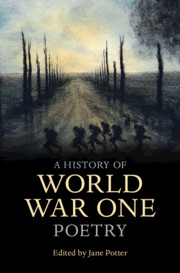Book contents
- A History of World War One Poetry
- A History of World War One Poetry
- Copyright page
- Dedication
- Contents
- Illustrations
- Contributors
- Acknowledgements
- Introduction
- Part I Literary Contexts
- Part II Nations and Voices
- Chapter 6 Germany and Austria-Hungary
- Chapter 7 Czech War Poetry
- Chapter 8 France
- Chapter 9 Belgium
- Chapter 10 Great Britain
- Chapter 11 Ireland
- Chapter 12 Russia
- Chapter 13 Serbia
- Chapter 14 The United States
- Chapter 15 Italy
- Chapter 16 South Africa
- Chapter 17 Australia and New Zealand
- Chapter 18 Canada
- Chapter 19 South Asian Poetry
- Part III Poets
- Part IV
- Bibliography
- Index
Chapter 19 - South Asian Poetry
from Part II - Nations and Voices
Published online by Cambridge University Press: 18 January 2023
- A History of World War One Poetry
- A History of World War One Poetry
- Copyright page
- Dedication
- Contents
- Illustrations
- Contributors
- Acknowledgements
- Introduction
- Part I Literary Contexts
- Part II Nations and Voices
- Chapter 6 Germany and Austria-Hungary
- Chapter 7 Czech War Poetry
- Chapter 8 France
- Chapter 9 Belgium
- Chapter 10 Great Britain
- Chapter 11 Ireland
- Chapter 12 Russia
- Chapter 13 Serbia
- Chapter 14 The United States
- Chapter 15 Italy
- Chapter 16 South Africa
- Chapter 17 Australia and New Zealand
- Chapter 18 Canada
- Chapter 19 South Asian Poetry
- Part III Poets
- Part IV
- Bibliography
- Index
Summary
The chapter recovers and investigates a substantial body of poems from undivided India composed during 1914–1918 and how such a corpus challenges conventional Anglo-centric understandings of the term 'First World War poetry'. Showcasing the remarkable range and richness of war poetry written in Punjabi, Urdu, Bengali, and English, the chapter examines some of their historical and formal complexities, including their oral and aural dimensions; in the absence of testimonies, such poetry fills in the gaps left by history. Starting with civilian verse and songs – elite and subaltern, written and spoken, pro-war and anti-war, direct, oblique or diffuse - I propose the idea of a war 'poetics' rather than ‘poetry’ from combatant men and village women who were often non-literate but highly literary. I conclude with readings of the 'war poems' of Rabindranath Tagore, Muhammed Iqbal and Kazi Nazrul Islam, the national poets of the future India, Pakistan, and Bangladesh respectively.
- Type
- Chapter
- Information
- A History of World War One Poetry , pp. 309 - 328Publisher: Cambridge University PressPrint publication year: 2023

